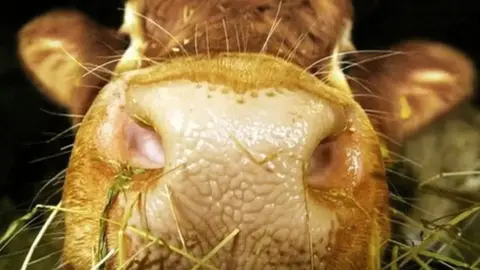Single case of BSE confirmed on Scottish farm
 PA Media
PA MediaA single case of Bovine Spongiform Encephalopathy (BSE) - commonly known as mad cow disease - has been identified on a farm in Dumfries and Galloway.
The Scottish government said movement restrictions had been put in place at the site and they covered other animals which had been in contact with the cow.
Further investigations are continuing into the origin of the disease.
Chief Veterinary Officer Sheila Voas said it involved the atypical strain of BSE which was not transmissible and Food Standards Scotland (FSS) said there was no risk to human health.
There are two types of BSE - classical and atypical.
Classical can transfer to humans who eat the meat while scientists believe atypical occurs spontaneously and is not passed on to humans.
The Dumfries and Galloway case was identified as a result of routine BSE surveillance.
The Scottish government said atypical BSE was not known to be a risk to public health and the animal had not entered the human food chain.
The owners of the affected animals are working with authorities on next steps.
Agriculture Minister Jim Fairlie said the government and other agencies had taken "swift and robust action to protect the agriculture sector".
'Decisive action'
"The fact we identified this isolated case so quickly is proof that our surveillance system for detecting this type of disease is working effectively," he said.
"I want to thank the animal's owner for their diligence.
"Their decisive action has allowed us to identify and isolate the case at speed which has minimised its impact on the wider industry."
Ms Voas said the fast detection of the case was proof that the surveillance system was doing its job.
"We are working closely with the Animal and Plant Health Agency, and other partners to identify where the disease came from," she said.
Ian McWatt, deputy chief executive of FSS, said strict controls were in place to protect consumers from the risk of BSE and those "important protection measures" remained in place.
There have been a handful of cases of BSE in the UK in the last decade including one in Ayrshire earlier this year.
Monitoring has been carried out since the crisis in the 1980s when 180,000 cattle were infected and 4.4 million slaughtered in order to eradicate the disease.
